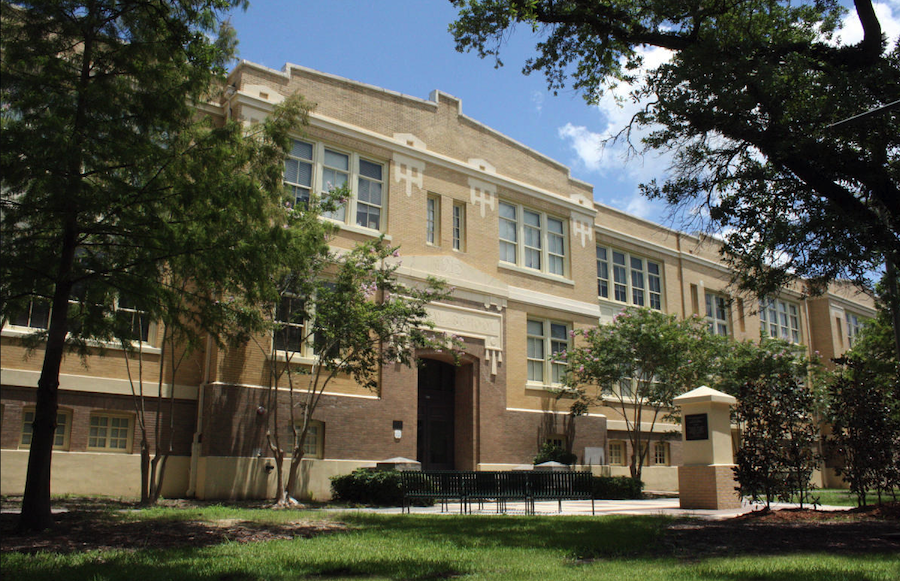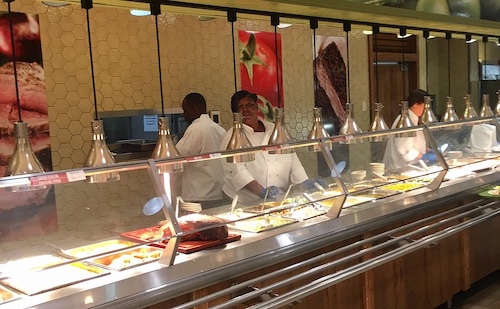Citgo vice president: Sale of petroleum refiner nearing the finish line
Published 4:18 pm Monday, September 16, 2024

- (Special to the American Press)
A U.S. federal court has accepted offers for the purchase of Venezuela-owned refiner Citgo Petroleum, the latest move in a long-running case where 18 creditors are seeking up to $21.3 billion for past expropriations and debt defaults.
Sterling Neblett, a chemical engineer by profession, has been employed by Citgo since 1990 — just two weeks after graduating from the University of Arkansas. During his tenure, he has served in economics, information technology and engineering capacities at the corporate offices in Houston and Tulsa, as well as at the Lemont Refinery in Chicago. He was appointed vice president and general manager of the Citgo Lake Charles complex in March 2022.
Neblett shared updates on the sale of Citgo recently to members of the Kiwanis Club of Lake Charles.
Trending
“In the 90s, Venezuela was a democratic nation that had an elite class but a whole bunch of people who were not. They had a lot of people who were poor,” Neblett said. “One of their own became president, Hugo Chavez, and over time they moved from a democratic society to more of a socialistic society. They didn’t oversee their finances very well so in the 2010s they started nationalizing businesses to generate income and wealth, effectively. They would take your business and give you pennies on the dollar.
“A lot of these companies didn’t like it, but they couldn’t do much about it except go to international court,” he continued. “Now, many years later, one of those companies in a U.S. court said, ‘The nation of Venezuela took my stuff. They didn’t pay me for it. We think that the oil company in Venezuela and the government of Venezuela are one and the same. If you agree with this, I can take American assets owned by the Venezuelan oil company and get my money back.’ The judge agreed with that.”
In October 2022, Judge Leonard P. Stark set in motion the sale of shares belonging to PDV Holding, Citgo’s parent company. A subsidiary of Venezuela’s state oil company PDVSA, Citgo owns more than 4,000 service stations and three refineries with a combined processing capacity of 769,000 barrels per day, according to reports.
“There’s only one share of Citgo because it’s privately held by the National Oil Company of Venezuela,” Neblett said. “There’s only one share for sale and that share represents everything Citgo touches — all of our refineries, our headquarters, our pipelines, a terminal network all down the east coast. Everything is for sale.”
After the judgment, 17 other companies that had their assets taken by Venezuela — including ConocoPhillips — lined up to ask for their share.
The auction procedure set by Stark will pay 18 creditors, which are looking to collect on international arbitration awards on a “first come, first serve basis,” based on when the court approved their writs. Crystallex, the first company to file suit, is seeking $1 billion; Tidewater, $80 million; ConocoPhillips, $1.3 billion; and O-I Glass, $700 million. Those companies are at the top of the list to receive payment.
Trending
“The value that the judge has allowed to enter this sale is over $20 billion,” Neblett said. “The way he set it up is the first of the trough gets paid, the second of the trough gets paid and eventually the money will be used and some won’t see payment. As opposed to diluting the pool with more people, the judge set the list of who is first, second and third in receiving payment.”
Neblett said the “Reuters and the Bloombergs of the world” have valued Citgo at $8 billion.
“So that first guy is going to get paid, but not everyone will,” Neblett said.
Sale terms
“Since everything is for sale and you have to buy it all, that limits the number of people interested,” Neblett said. “They asked for people to do a cold bid just to see the interest and the judge would take that and set up a special master to vet all the companies. In the second round, people who made it through the cold bid actually got to have a look at Citgo. We opened our doors and let them see everything. They came to Lake Charles, they came to our corporate offices in Houston.”
Neblett said he feels good about the potential new owners.
“I’ve met a lot of these companies and a lot of them say, ‘We think that oil is amiss in the world. People don’t respect that people will still need oil so we think if we get in, we can make our money and then some between now and whenever oil runs its course.”
Neblett said he agrees there will be a green conversion eventually when it comes to global oil demand — which currently is about 100 million barrels per day — but said factors such as population growth, energy use in developing countries and the world’s ability to build grids, nuclear plants and wind farms down the road will keep that oil demand through at least 2050.
“It’s taken decades to get the infrastructure we need today and it’s going to take decades to get where we need to go,” he said.
Neblett said now that the doors have been opened to bidders, companies are seeing how the organization really operates and its safety records.
The next stage is to enter due diligence, which he said the judge would like to finalize this month.
“He wants to announce to the world in November who gets Citgo,” Neblett said. “Will the sale go through this year? Probably not. Will it happen next year? Maybe. At the end of it all, I feel safe for jobs. They want to keep us here because if they kick us all out they’ve got to train everybody to run it.”
Infrastructure
Neblett said the company — which went online in May of 1944 — was originally built to run east Texas oil from the Longview and Tyler areas.
“Over time, people started producing more and more oil that was different from east Texas oil, cheaper than east Texas oil but it didn’t fit our refinery too well with the hardware we had built during World War II,” he said. “In the 1960s and 1970s we started building hardware to make us capable to process these more difficult crude oils and those crude oils — a lot of them — came from Venezuela.”
Venezuela nationalized their oil business in the 1970s and combined all the different operators under one roof.
“It was successful and they decided to invest in opportunities around the world where people can lock in their oil,” he said. “After the oil crash in the 80s, they wanted a dedicated customer and what better way to dedicate a customer than to buy a customer? They bought into a lot of refineries around the world and they merged all the refineries they bought in the United States under the Citgo name.”
The Lake Charles refinery was included at the end of 1989-beginning of 1990.
“We had to add more pieces and parts so we could be more flexible all over the world,” he said. “When the U.S. put sanctions on Venezuela in 2019, we had to immediately cease. We all the sudden lost all of our business and we had to start looking for other crude — hello, fracking. We’re now running almost all of west Texas’s crude and very little crude from anywhere else, except Calgary, Canada.”
He said underground pipelines from the Rocky Mountains in Canada bring the crude to their plant every day.
Neblett said the company struggled during the COVID-19 outbreak.
“We had a terrible time during COVID because nobody drove, people worked from home — if they kept their job — and that happened globally,” Neblett said. “It wasn’t a problem in a single country; it was universal. It was terrible for our industry.”
But then Ukraine was invaded by Russia in 2022.
“It broke every link in the chain of how oil moves around the world,” he said. “Whenever there’s disruption or things aren’t as to plan, it creates volatility. What’s interesting about our business is we don’t set our price. We don’t set the price we pay for crude oil; it’s done in the market. We don’t set the price for what we get paid for gasoline; it’s also set in the market. We just get what’s in between. If that opens up, that’s good; if it squeezes down, what can we do?”
Neblett said as the company started to see rising profits after the invasion, decisions were made to update the Lake Charles facility.
“When we started having a good 2022, we decided we needed to reinvest,” he said. “We have a lot of original equipment still going so we have been investing heavily in infrastructure and, hopefully, in the next year or two we’ll build something new — which we haven’t done in 15 years. The reason we need to do that is because the gasoline we make is just like the gasoline the people down the street make, just like the gasoline the people in China make and we don’t want to be the slowest spare. We want to be around for a while, we want to be in Lake Charles for a while.”
He said the company has just over 1,000 full-time, direct employees at the site and last year averaged an additional 2,500 contractors every day.
“We’re going to get very close to that this year, too,” he said. “Because we work a factory environment 24/7, I think there is very little risk to the worker in Lake Charles, Calcasieu Parish. I don’t think you’ll see any impact here, job-wise. We also have a corporate bargaining agreement here that’s pretty iron-clad. No one wants to spend billions on us to just shut us down and walk away. They’re going to want to keep us going.”





